Intel Core i3-8300 Benchmarks
For this exercise, we are using our legacy Linux-Bench scripts which help us see cross-platform “least common denominator” results we have been using for years as well as several results from our updated Linux-Bench2 scripts. At this point, our benchmarking sessions take days to run and we are generating well over a thousand data points. We are also running workloads for software companies that want to see how their software works on the latest hardware. As a result, this is a small sample of the data we are collecting and can share publicly. Our position is always that we are happy to provide some free data but we also have services to let companies run their own workloads in our lab, such as with our DemoEval service. What we do provide is an extremely controlled environment where we know every step is exactly the same and each run is done in a real-world data center, not a test bench.
We are going to show off a few results, and highlight a number of interesting data points in this article.
Python Linux 4.4.2 Kernel Compile Benchmark
This is one of the most requested benchmarks for STH over the past few years. The task was simple, we have a standard configuration file, the Linux 4.4.2 kernel from kernel.org, and make the standard auto-generated configuration utilizing every thread in the system. We are expressing results in terms of compiles per hour to make the results easier to read:
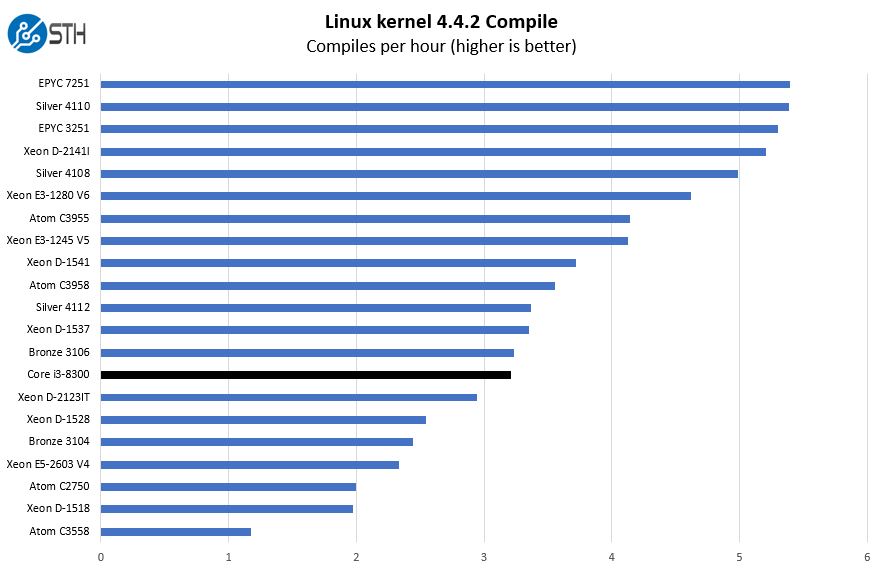
Clock speed is still important. This $150 CPU is out-performing a $213 Intel Xeon D-2123IT. It is keeping pace with an 8 core, 1.7GHz Intel Xeon Bronze 3106. Both of those are used for different features. Also, the Intel Xeon D-2123IT has onboard 10GbE as well as its PCH. If you, however, are building a server with 1GbE and two SATA hard drives, saving that $60+ can be important.
c-ray 1.1 Performance
We have been using c-ray for our performance testing for years now. It is a ray tracing benchmark that is extremely popular to show differences in processors under multi-threaded workloads. We are going to use our legacy 4K results which work well at this end of the performance spectrum.
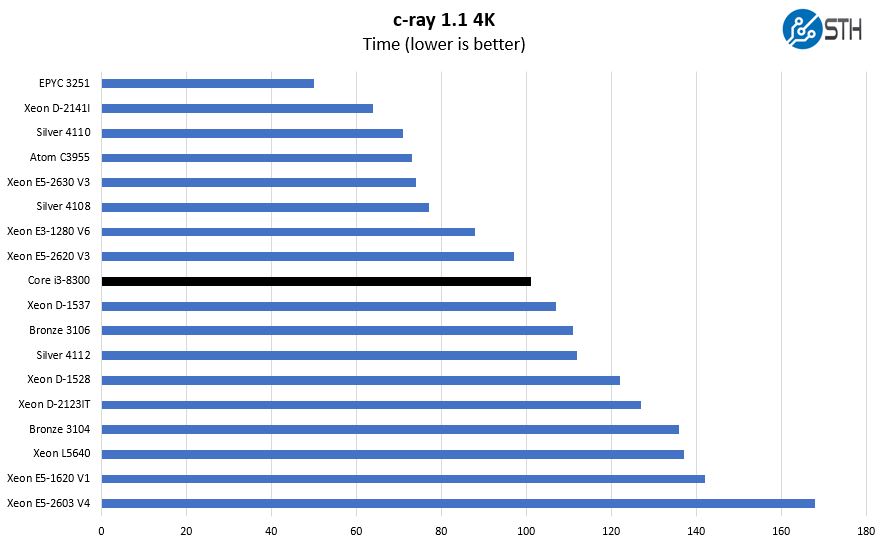
Simply having a high base clock speed, no hyper-threading, and Intel’s current cache architecture means that the chips are faster than many higher-cost and higher core count offerings. If you had a small database and little need for high-capacity RAM support, this is a better option than the Intel Xeon Silver 4112 in many cases. That is going to be a key theme as we continue with these benchmarks.
7-zip Compression Performance
7-zip is a widely used compression/ decompression program that works cross-platform. We started using the program during our early days with Windows testing. It is now part of Linux-Bench.
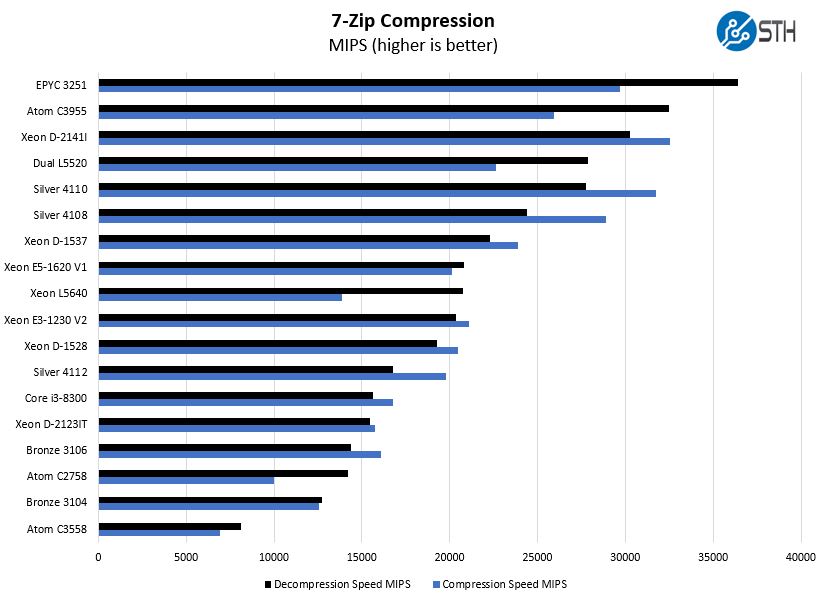
We added an older generation option, the 6 core, 12 thread Intel Xeon L5640. Although the TDP was 60W on that part, it also had a power sucking I/O chipset. Eight years later, with four threads the Intel Core i3-8300 is very competitive.
NAMD Performance
NAMD is a molecular modeling benchmark developed by the Theoretical and Computational Biophysics Group in the Beckman Institute for Advanced Science and Technology at the University of Illinois at Urbana-Champaign. More information on the benchmark can be found here. We are going to augment this with GROMACS in the next-generation Linux-Bench in the near future. With GROMACS we have been working hard to support Intel’s Skylake AVX-512 and AVX2 supporting AMD Zen architecture. Here are the comparison results for the legacy data set:
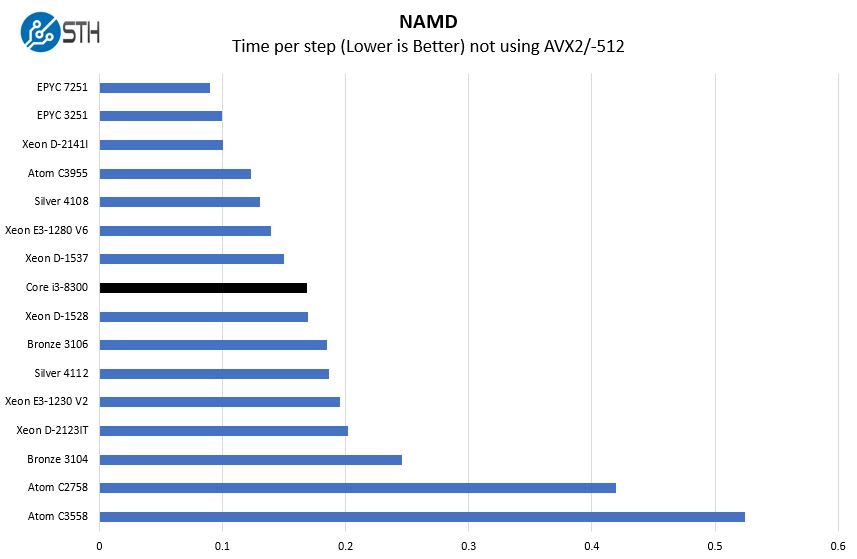
HPC applications like NAMD and benchmarks like Linpack tend to perform better with hyper-threading turned off. As a result, the Intel Core i3-8300 performs very well compared to higher thread count solutions.
Sysbench CPU test
Sysbench is another one of those widely used Linux benchmarks. We specifically are using the CPU test, not the OLTP test that we use for some storage testing.
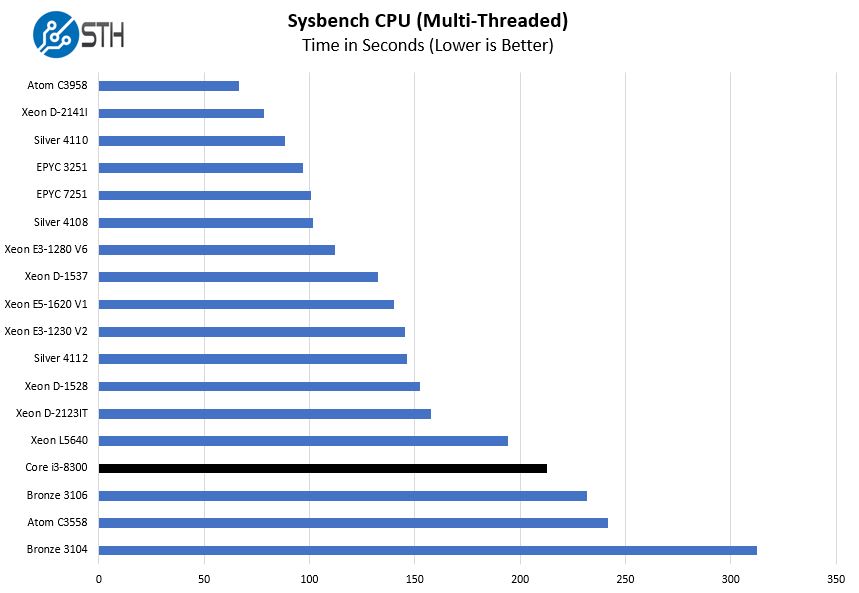
The lack of threading hurts the chip in multi-threaded performance. We wanted to show single-threaded results as well:
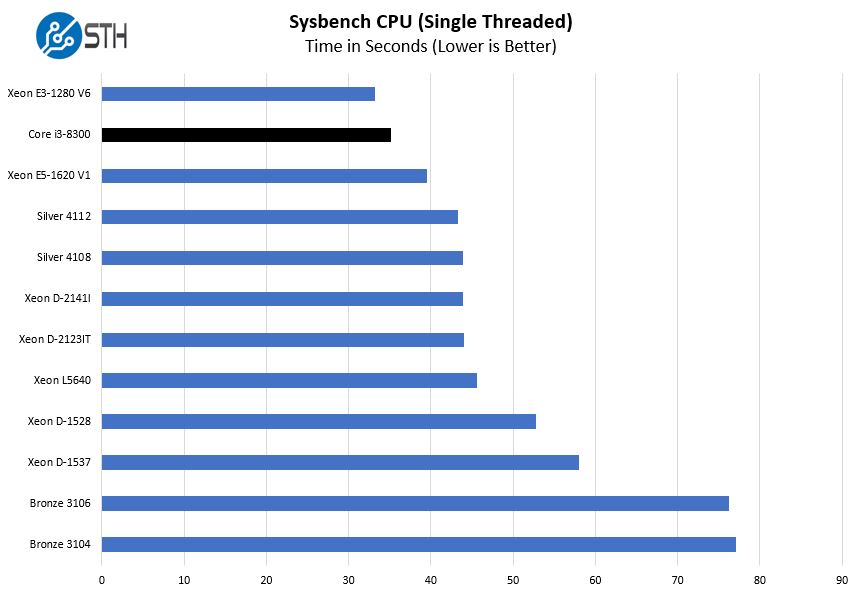
Here the higher clock speeds push it past the Intel Xeon D-2100 series, Intel Xeon D-1500 series, and Xeon Silver / Bronze with ease. The Intel Xeon E3-1280 V6 simply has a higher clock speed but the gap is not great. If you need single threaded performance, we like the Intel Core i3-8300.
OpenSSL Performance
OpenSSL is widely used to secure communications between servers. This is an important protocol in many server stacks. We first look at our sign tests:
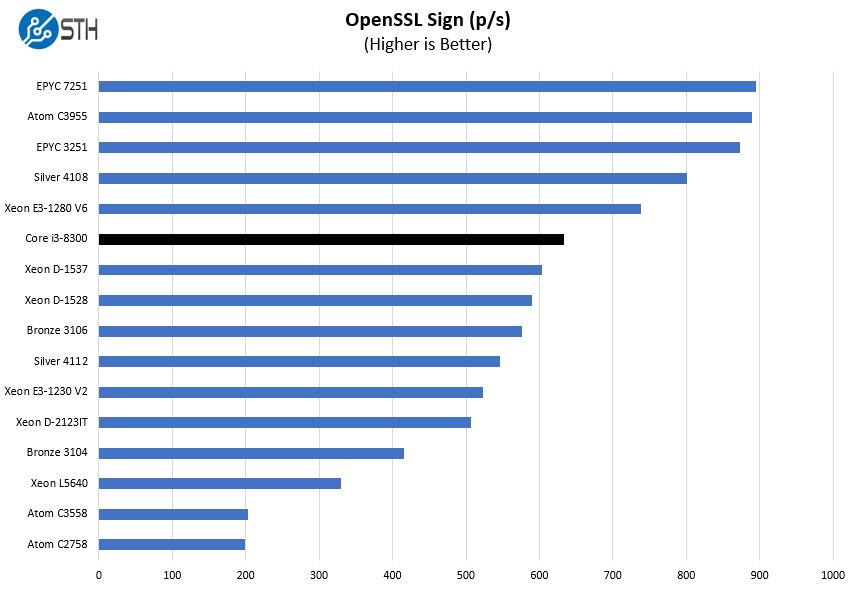
here are the verify results:
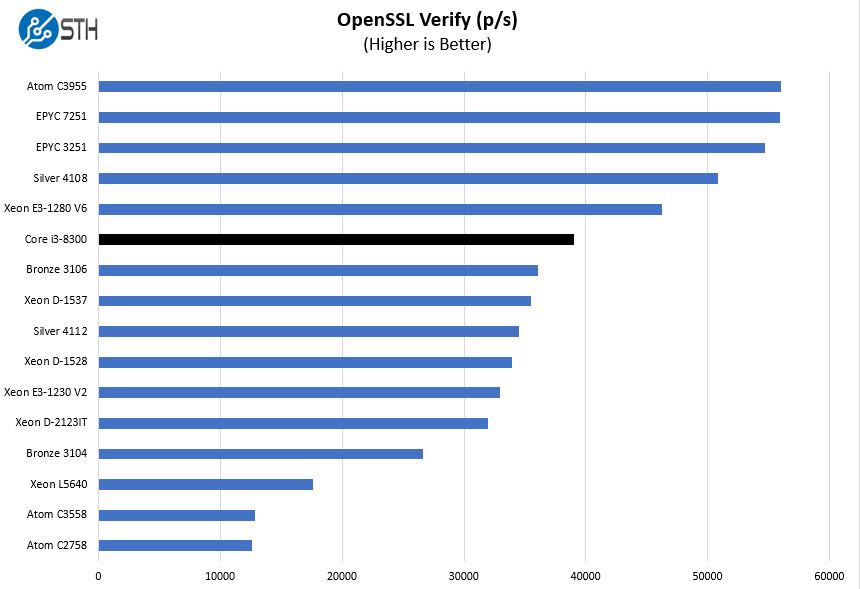
Here the lack of threads hurts the Intel Core i3-8300 in some respects, but the high 3.7GHz base clock speed helps close the performance gap.
UnixBench Dhrystone 2 and Whetstone Benchmarks
Some of the longest-running tests at STH are the venerable UnixBench 5.1.3 Dhrystone 2 and Whetstone results. They are certainly aging, however, we constantly get requests for them, and many angry notes when we leave them out. UnixBench is widely used so we are including it in this data set. Here are the Dhrystone 2 results:
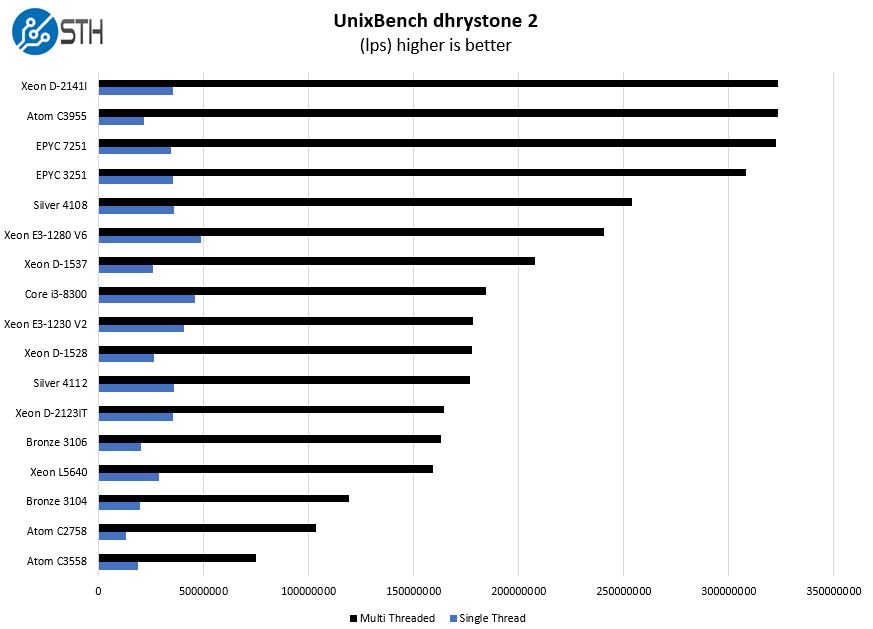
Here are the whetstone results:
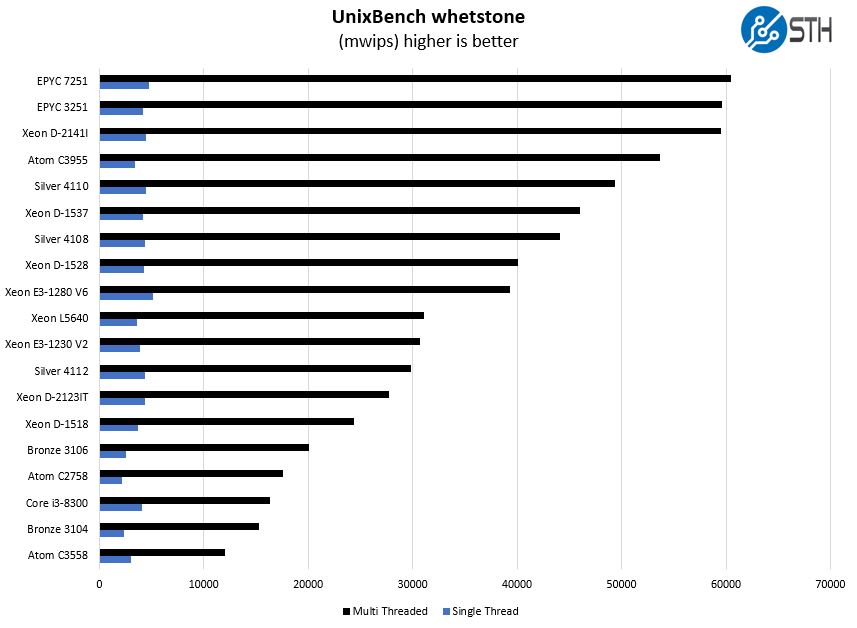
Here we see the pattern of strong single-threaded performance, however, the lack of hyper-threading means multi-threaded performance is weak.
GROMACS STH Small AVX2/ AVX-512 Enabled
We have a small GROMACS molecule simulation we previewed in the first AMD EPYC 7601 Linux benchmarks piece. In Linux-Bench2 we are using a “small” test for single and dual socket capable machines. Our medium test is more appropriate for higher-end dual and quad socket machines. Our GROMACS test will use the AVX-512 and AVX2 extensions if available.
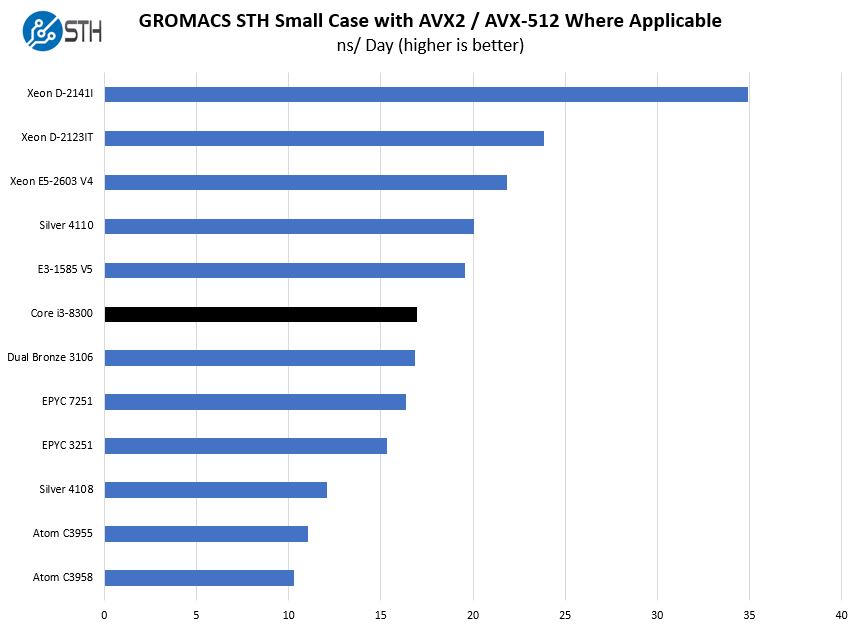
This is single-port FMA AVX-512 performance paired with low thread counts. Perhaps the most interesting result is that one can see the dual Intel Xeon Bronze 3106 setup fall flat running code on many low-speed cores. That is a quad-core high-speed CPU beating 16 low-speed cores at lower power consumption.
Chess Benchmarking
Chess is an interesting use case since it has almost unlimited complexity. Over the years, we have received a number of requests to bring back chess benchmarking. We have been profiling systems and are ready to start sharing results:

Our chess benchmarking brings the Intel Core i3-8300 to where we would expect in our benchmark stacking. The high clock speeds make up for the lack of hyper-threading narrowly putting it past an Intel Xeon D-2123IT 4 core/ 8 thread CPU.
Next, we are going to have the power consumption, market positioning, and our final words.


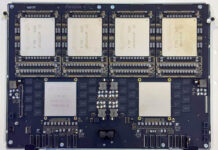
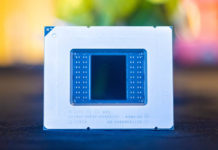
Intel going for the low end…
I’ve been watching these closely as well once I discovered the ECC support. These would be stellar for a Plex media server where all the GPU transcoding could be done through the integrated GPU. High clock speeds help to make the server feel snappy too. win/win if I needed to build a new media server.
Unfortunately, my needs involve many docker containers and VMs now. So 8 core+ procs for me. Hoping to see a Xeon-E 8-core CPU in the coming months.
Would be interesting to see the 8300T (low power) and 8350K (higher clock) added to this comparison as well.
Hi, can these run on the C232 based boards such as the Supermicro X11SSL-F-O?
@David J, they’re only compatible with socket 1151-3 so unfortunately only C246 and C242 chipsets are supported
These benchmarks just made me want a 3251 even more to be honest.